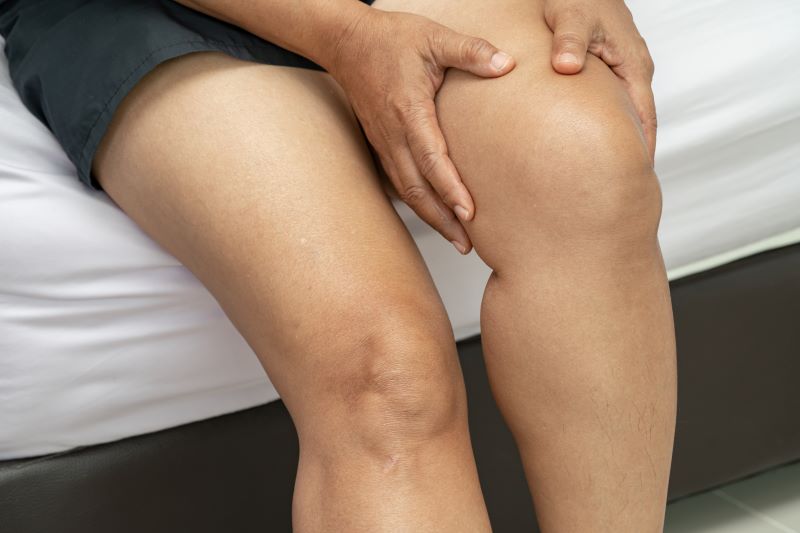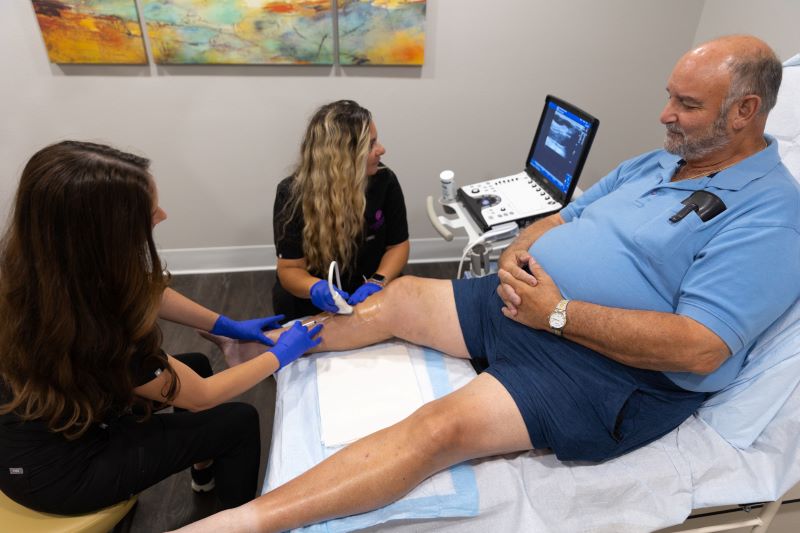
We’ve all heard of the dangers to health that a blood clot causes when it breaks free. Deep vein thrombosis (DVT) involves the formation of those dangerous blood clots in a deep vein, and it’s one of the more life-threatening vein conditions.
DVT can impact anyone, and it might not even show symptoms. Knowing your risk factors and having deep vein thrombosis treatment in North Port can help you both treat and prevent DVT.
At Florida Lakes Vein Center, we have the tools, the techniques, and the expertise to diagnose and treat deep vein thrombosis. Request a vein screening, or call us at 941.777.7771. Our caring team provides fast and accurate diagnosis and treatment to prevent embolisms and return you to better health.
What is deep vein thrombosis?
Deep vein thrombosis occurs when a blood clot forms in a deep vein, usually in a patient’s legs. The blood clot can block blood flow, causing complications for comfort and movement. Worse, should it break free, it can travel to the lungs and cause a life-threatening pulmonary embolism.
Signs of Deep Vein Thrombosis
DVT can show several different symptoms, or none at all. The more common warning signs include:
- Throbbing or cramping pain in the calf or thigh of one leg (rarely both legs)
- Swelling in one leg (rarely both legs)
- Feeling warmth in the skin of the painful area
- Red or darkened skin in the painful area
- Swollen veins that are hard or sore when you touch them
If you leave your deep vein thrombosis untreated, that can lead to complications, including:
- Vein inflammation (phlebitis)
- Venous ulcers
- Pulmonary embolism
Pulmonary embolism occurs when the clot dislodges from the leg vein and travels through the bloodstream to the lungs.
The Causes of Deep Vein Thrombosis
Poor Blood Circulation
Any factor that contributes to improper blood flow or clotting can eventually cause deep vein thrombosis. Poor blood circulation often contributes to DVT through the following mechanisms:
- Blood Flow Stagnation. During prolonged periods of immobility (sitting or standing for long hours), blood can pool in the veins. When blood flow slows down or stagnates, it can lead to the formation of blood clots.
- Blood Vessel Damage: When blood flow is reduced/slowed, the resultant pressure in the vein can build up, damaging the inner lining of the blood vessels (the endothelium). This exposes the underlying tissues to blood, which can trigger a coagulation cascade and form a blood clot.
- Clotting Factor Increase. Diminished blood flow can increase the level of coagulation factors in the bloodstream. Though necessary for blood clotting/wound repair, in larger amounts, these factors are more likely to form clots in the pooled blood.
- Hypercoagulability: Even if the clotting factors don’t increase, poor blood flow may increase blood’s tendency to clot without exacerbating circumstances.
As you can see, poor blood flow contributes to blood clot formation in your veins in multiple ways, which can lead to the need for deep vein thrombosis treatment in North Port.
Venous Damage Factors
Damage to your vein could be the result of surgery, inflammation, infection, or other injury. If the vein damage is close to the surface of the skin, you may be able to see it as either varicose veins or spider veins.
Vein damage can affect not only the walls of the vein (phlebitis), but it may also cause the valves in your veins to malfunction. These valves are what stop blood from backflowing as your heart beats. If a valve isn’t working right, the blood can pool, increasing pressure in the vein and causing it to distend.

In either case (inflammation of the vein or valve damage), blood flow decreases, and the risks mentioned above become more likely.
Other Risk Factors for DVT
Though damage to the vein through sickness, injury, or infection is one of the major causes of poor blood circulation, other factors can increase your likelihood of developing DVT. These include:
- Aging
- Sedentary lifestyle
- Pregnancy
- Hormonal medications
- Being overweight
- Smoking
- Orthopedic or general surgery
- Some cancers
- Heart failure
- Inflammatory bowel disease
- Genetics/family history
When you come in for a vein screening, we’re going to discuss all of these lifestyle and health history possibilities. Our team will work to achieve the clearest picture of your current vein health so that we can diagnose properly and prescribe the best treatments for your needs.
How Florida Lakes Vein Center Addresses DVT
Our vein care specialists use information about your symptoms, lifestyle, and medical history to create a treatment plan that is completely tailored to your situation and needs.
There is no “cookie cutter” deep vein thrombosis treatment in North Port. Instead, your health as a whole person is taken into account, so that we not only treat the symptoms, but also address the cause of the concerns.
What the Treatment Plan Can Do for You
Once we’ve determined that DVT is the issue, we have specific goals for treatment. They include:
- Stopping the clot from growing.
- Reducing the risk of long-lasting complications (post-thrombotic syndrome).
- Implementing measures for future blood clot prevention.
- Preventing a catastrophic pulmonary embolism.
Luckily, medication and changes in personal lifestyle habits often do the trick for deep vein thrombosis treatment in North Port. However, surgery may be required. Your Florida Lakes Vein Center specialist will discuss the details so you can fully understand which treatments are right for you.
The DVT Treatment Process
Though every patient is unique and their treatments will be personalized accordingly, the experience usually involves three phases of treatment:
Understanding You as a Patient and a Person
Your provider needs to know more than your chart. They should get to know you, including your lifestyle, your goals for treatment, your sensitivities, and, of course, where it hurts.
Your vein specialist will take all the time needed to sit down with you and discuss your situation. They will listen, ask questions, and make sure you are heard and understood. They will also look at the leg (or legs) causing the issue. During this examination, they’ll ask you questions about your current and recent experiences with symptoms, including (but not limited to):
- Leg heaviness or fatigue
- Restless legs
- Itching or burning skin
- Leg or ankle swelling
- Leg pain, aching, cramping, or throbbing
- Skin discoloration or texture changes
- Open wounds or sores
This is also a great time for you to share information on anything they haven’t asked about that you feel is relevant. Although led by a vein specialist, this is a conversation between you and your provider. Ask questions about us, too. The more we jointly understand, share, and connect, the better we can ascertain and deliver your deep vein thrombosis treatment in North Port.
Diagnosing the Issue With Precision
After discussing your issues and conducting the external assessment of the problematic leg(s), your vein specialist will use ultrasound technology to view the blood vessels and their surrounding soft tissue in the affected area.

This advanced technology produces detailed images of the vein itself and the surrounding area. Florida Lakes Vein Center utilizes Doppler ultrasound, which lets your specialist see the blood flow and any blocked areas in real time. We also use Duplex ultrasound, which combines regular and Doppler ultrasound, for a clear and concise picture from the inside of what the problem entails.
All of our ultrasound diagnostic tools work painlessly, non-surgically, non-invasively, and surprisingly fast for diagnosis and to determine the right deep vein thrombosis treatment in North Port. Their results also answer the question of whether or not surgery may be necessary.
Addressing DVT in-Office and at Home
With your accurate diagnosis in hand, we can move on to the treatment phase. Your vein specialist will most likely prescribe medication to alleviate the DVT. They will also schedule regular follow-up appointments to make sure the medications are doing their job and your situation is improving.
For patients experiencing swelling in the leg, that usually occurs from non-DVT issues. Most frequently, the swelling is caused by blood back-up resulting from damaged/poorly functioning veins or varicose veins.
Also, patients commonly suffer swelling after surgical procedures (knee or hip replacement, general surgery, gynecological surgery, etc.). A DVT ultrasound works to rule out the blood clot. If there is one present and it’s caught early, we can treat it with blood-thinning medications and ultrasound follow-up.
Once the deep vein thrombosis treatment in North Port has made the DVT “disappear” (thin out), or has moved it to the outer wall where it no longer poses a threat, we can discontinue the blood thinners in most patients.
About Those Varicose Veins
We offer varicose vein treatments to reduce or eliminate them so that blood flow can be improved. These treatments include:
When Hospitalization is Right
If a patient is diagnosed with deep vein thrombosis that presents an immediate and direct threat to their life, the patient will be treated at a hospital by an interventional physician. In our experience, most DVT cases do not exhibit this level of threat and can be treated in the office with close, weekly follow-ups and blood-thinning medications.
At-Home Care
Your vein specialist will make sure you have a complete understanding of what to expect from your treatment before it begins. We’ll also discuss ways to lessen the possibilities for DVT in the future through self-care, which can include eliminating bad habits, making lifestyle changes to improve health, and incorporating exercise to enhance circulation in your legs.
Before you leave our offices, you’ll have everything you need to address your deep vein thrombosis from multiple fronts.
Find Help and Hope Right Now
Don’t wait to discover you have DVT. Contact us for a personal consultation, or call us at 941.777.7771. There’s no reason to gamble with your life. Our deep vein thrombosis treatment in North Port can deliver results for better health.
Proper Care is a “No Veiner!”
Take control of your pain with venous disease treatment at Florida Lakes Vein Center. We’ve helped more than 10,000 patients across the region feel better and look better through venous care for both health and aesthetics. We pride ourselves on being the top providers of DVT treatment and are ready to help you today.
Try our free online Vein Screening Tool!